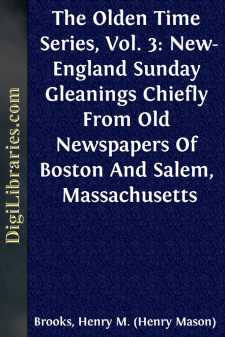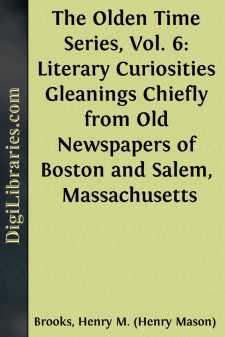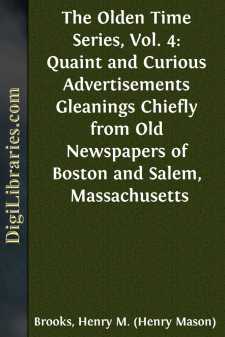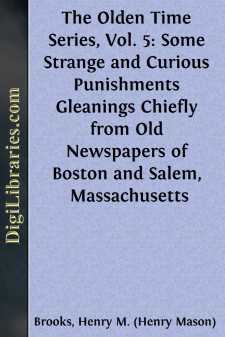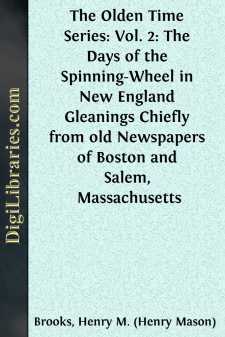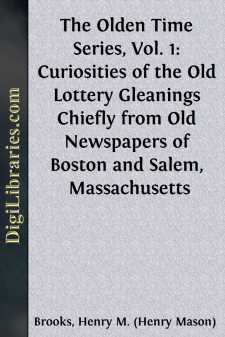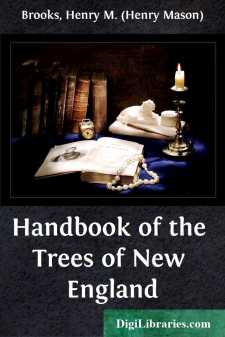Categories
- Antiques & Collectibles 13
- Architecture 36
- Art 48
- Bibles 22
- Biography & Autobiography 813
- Body, Mind & Spirit 142
- Business & Economics 28
- Children's Books 17
- Children's Fiction 14
- Computers 4
- Cooking 94
- Crafts & Hobbies 4
- Drama 346
- Education 46
- Family & Relationships 57
- Fiction 11829
- Games 19
- Gardening 17
- Health & Fitness 34
- History 1377
- House & Home 1
- Humor 147
- Juvenile Fiction 1873
- Juvenile Nonfiction 202
- Language Arts & Disciplines 88
- Law 16
- Literary Collections 686
- Literary Criticism 179
- Mathematics 13
- Medical 41
- Music 40
- Nature 179
- Non-Classifiable 1768
- Performing Arts 7
- Periodicals 1453
- Philosophy 64
- Photography 2
- Poetry 896
- Political Science 203
- Psychology 42
- Reference 154
- Religion 513
- Science 126
- Self-Help 84
- Social Science 81
- Sports & Recreation 34
- Study Aids 3
- Technology & Engineering 59
- Transportation 23
- Travel 463
- True Crime 29
Henry M. (Henry Mason) Brooks
Henry M. Brooks, also known as Henry Mason Brooks, was an American author and educator recognized for his contributions to children's literature in the early 20th century. He wrote several popular books that often featured themes of adventure and moral lessons, appealing to young readers and their parents alike. In addition to his literary work, Brooks was dedicated to improving education, serving as a teacher and administrator in various schools throughout his career.
Author's Books:
Sort by:
NEW-ENGLAND SUNDAY. Seeing in an old paper that General Washington was stopped by a "tythingman" in Connecticut in 1789 for the "crime" of riding on Sunday, we were naturally led to think about the "Sabbath question," as it is sometimes called. We find the account referred to in the "Columbian Centinel" for December, 1789. THE PRESIDENT AND THE TYTHINGMAN. The...
more...
LITERARY CURIOSITIES. The following humorous lines well describe the difficulty that editors find in pleasing the public. They are expected to know everything, and to be able to satisfy all tastes and capacities. No imperfections can be excused in conductors of newspapers; they are not even allowed to be unfortunate. THE EDITOR.That editor who wills to please,Must humbly crawl upon his knees,And kiss...
more...
CURIOUS ADVERTISEMENTS. Among the mass of advertisements that have appeared from time to time in newspapers are to be found some which are very quaint and curious. Such are not, in all cases, intended by the writers to be so; but they sound so, especially to those persons who have an ear for strange or humorous things. Sometimes, indeed, it is the intention of the writers to attract particular notice...
more...
SOME STRANGE AND CURIOUS PUNISHMENTS. In the month of January, 1761, "Joseph Bennett, John Jenkins, Owen McCarty, and John Wright were publickly whipt at the Cart's Tail thro' the City of New York for petty Larceny,"—so the newspaper account states,—"pursuant to Sentence inflicted on them by the Court of Quarter Sessions held last Week for the Trial of Robbers," etc. In...
more...
THE DAYS OF THE SPINNING-WHEEL IN NEW ENGLAND. * * * * * WITHIN the last few years many young ladies have searched country houses or ransacked old garrets to find spinning-wheels, which, like old chairs, tall clocks, and warming-pans, have now become objects of curiosity and interest to those who take a fancy to antique articles. It has become fashionable to have these things to adorn our Queen Anne...
more...
INTRODUCTION. While this work does not pretend to be a history, it will yet present many historical facts. Its object is to show from old newspapers, which are not accessible to all, such items and comments upon a variety of subjects as might be supposed to amuse or instruct both old and young. It is not the easy thing that many imagine to examine, read, and select from a vast number of newspapers such...
more...
PREFACE. There is no lack of good manuals of botany in this country. There still seems place for an adequately illustrated book of convenient size for field use. The larger manuals, moreover, cover extensive regions and sometimes fail by reason of their universality to give a definite idea of plants as they grow within more limited areas. New England marks a meeting place of the Canadian and...
more...


